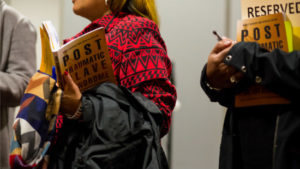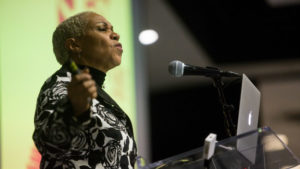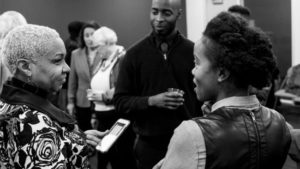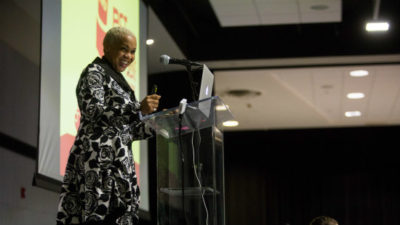MLK Lecture Focuses on Lasting Effects of Slavery, Importance of Healing
Internationally known researcher, educator and author Joy DeGruy delivered a thought-provoking presentation of healing to a sold out crowd at the 10th annual Martin Luther King Jr. Lecture at the University of Missouri-Kansas City.
DeGruy is widely known as an ambassador for healing and being a voice for those who have struggled in search of the past and continue to struggle through the present. With 20 years’ worth of experience in social work and clinical psychology, she has traveled around the world presenting lectures, workshops and seminars that provide insight into various cultural and ethnic groups who form the basis of contemporary American society. One of those insights is into the concept of Post Traumatic Slave Syndrome.

According to DeGruy’s website, “PTSS is a theory that explains the [origin] of many of the adaptive survival behaviors in African American communities throughout the United States and the African Diaspora. It is a condition that exists as a consequence of multigenerational oppression of Africans and their descendants resulting from centuries of chattel slavery. A form of slavery which was predicated on the belief that African Americans were inherently/genetically inferior to whites. This was then followed by institutionalized racism which continues to perpetuate injury.”
DeGruy pointed out that the term “Post Traumatic Slave Syndrome” causes an immediate, visceral response. “As a clinician, that’s always been surprising to me. I wanted to know what it was about the word ‘slavery’ that makes people so combative,” said DeGruy, explaining what drove her to write her book Post Traumatic Slave Syndrome — America’s Legacy of Enduring Injury and Healing.

The reason, DeGruy said, is because Americans have not learned how to deal with one another in a post-slavery America. Thus, the topic of slavery causes discomfort or cognitive dissonance. What most believe to be true about slavery is inconsistent with the truth of what actually occurred during those 400 years and, additionally, Jim Crow.
“When we talk about multi-generational trauma, I started to notice certain behaviors that existed in the black community,” said DeGruy. As she walked through specific examples of behavior patterns—vacant esteem, marked propensity for anger and violence and internalized racism—she explained how those behaviors were developed and where they come from. Likewise, DeGruy touched on noticeable behaviors of the dominant white group—desensitization, or diminished emotional response to negative stimuli, and the inability to empathize with the black experience in America—and how those also stem from multi-generational trauma.
“You can’t fix what you don’t understand, so you have to understand in order to know where you can heal,” said DeGruy. “It’s important when we talk about healing and understanding who you are, that we start telling the truth. It’s the secrets that make us sick.”

Her presentation focused on revealing truth to begin healing. History, DeGruy said, paints perfect men and noble nations, but it does not tell the truth.
DeGruy walked the audience through the truths in history from the beginning of the Diaspora, how slavery was justified to the effects it has had on generations of people – both the descendents of the oppressed and those who did the oppressing.
As she closed, she touched briefly on epigenetics and how trauma affects DNA. DeGruy said according to research, trauma is trapped in DNA and can thus be passed down through generations. A child conceived post-trauma will acquire subtractive genetic information. No one group, DeGruy said, went unscathed. Everybody is broken.
“I understand we are coming up on Black History Month, but we should have learned this earlier,” DeGruy said, adding that she’s trying to stop this trauma from happening to future generations.
After 400 years of trauma, slavery was abolished but trauma continued through extended eras of oppression and is now affecting our children. DeGruy said, “We have to heal together or we will inadvertently pass our injury on to the next generation.”

